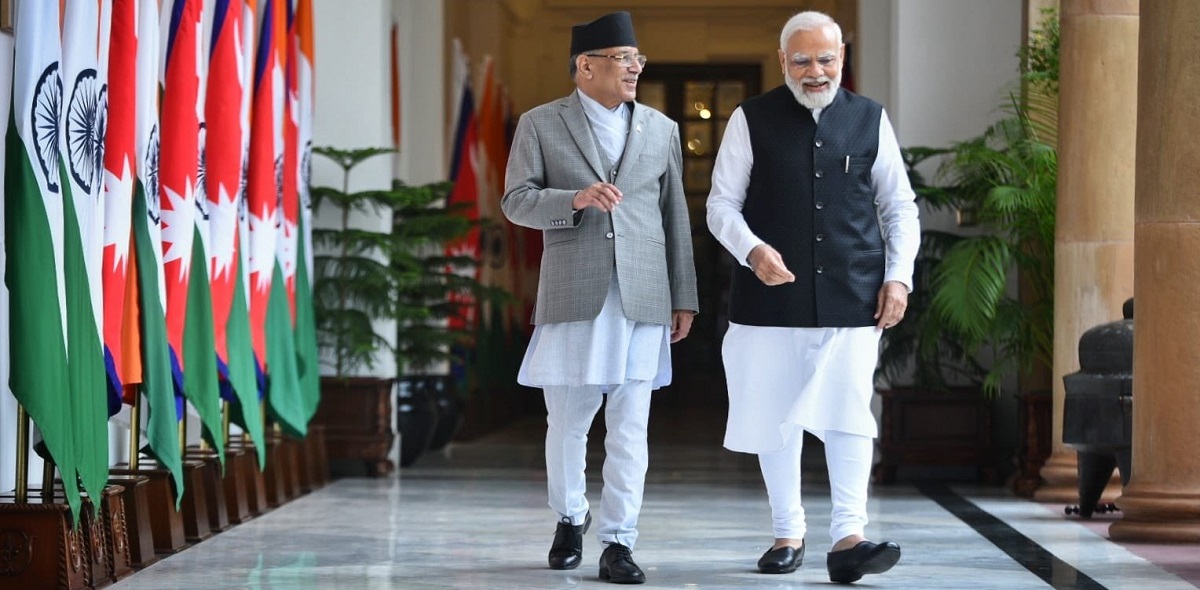New Delhi: There were many doubts prior to the visit of Prime Minister Pushpa Kamal Dahal ‘Prachanda’ to India. After he landed in New Delhi, speculations about the possible agreements between the two countries were made. Many wondered what issues would be raised in the bilateral discussions. It was not uncommon to see such curiosity as it was a matter of interest for many.
The question arises on what kind of support India will provide during every visit of the Prime Minister. This time, the information was not made public until the last minute. A day before the meeting between the two prime ministers, NepalView had made the would-be agreement public.
Prime Minister Prachanda is about to wrap up his official visit to India. He will travel to Indore and Ujjain on Friday morning. He will return to Delhi on Saturday and return back home.
What has Nepal gained from this visit?
The two countries had already reached an agreement not to open up contentious issues during the visit. Earlier, many stressed the need to creating an atmosphere of trust between the two countries and the leaders. Experts from both sides were advising to focus on economic issues rather than political issues this time.
As a result, the contentious issues did not surface much during the visit. PM Dahal raised questions about Nepal’s territory being included in the map of ‘Akhand Bharat’ that are placed in the Parliament of India. The Indian side has said that it is only a cultural and emotional aspect and urged not to take it politically. This led to the coziness in the relationship. The two prime ministers were focused on creating an atmosphere of trust.
Dahal’s visit is considered fruitful due to some agreements, inauguration, new projects and assurances. Important agreements have been reached, especially in the areas of transit and energy. The kind of support India provided during the visit and benefits to Nepal can be enumerated as follows:
Transit agreement renewal, petroleum pipeline and storage projects
The transit agreement between the two countries has been renewed. With the renewal of the agreement, India will cooperate mainly on four issues. A new petroleum pipeline will be built and expansion of another pipeline will take place. Petroleum storage depots will be set up at two places.
A petroleum pipeline will be constructed from India’s Siliguri to Charali in Jhapa. The existing petroleum pipeline up to Amlekhgunj will be expanded to Lothar in Chitwan. Unveiling the agreement, Indian Prime Minister Narendra Modi said that a new pipeline would be set up and one would be expanded as petroleum pipeline has been found to have great benefits.
Petroleum storage depots will be set up in Charali of Jhapa and Chitwan. It is estimated that the project will cost more than Rs 17 billion.
Preliminary agreement for long-term electricity trade
Nepal and India have signed a preliminary agreement for long-term power trade. The agreement states that India will engage in electricity trade for 25 years. Managing Director of Nepal Electricity Authority (NEA) Kulman Ghising, who was part of the delegation, expressed confidence that it would boost Nepal’s electricity exports.
India has also pledged to buy up to 10,000 MW of electricity from Nepal within 10 years. Addressing a joint press conference, PM Narendra Modi informed about the agreement aimed at buying 10,000 MW of electricity in 10 years.
Earlier, many thought that this agreement would not be signed. But on Thursday afternoon, the officials of the two countries reached an agreement. This agreement has also encouraged the energy entrepreneurs as the market has been assured.
Ending hurdles to export electricity to Bangladesh
India has agreed to allow export of electricity to Bangladesh through its route. An agreement has been reached to negotiate with Bangladesh and sign a tripartite agreement.
India has also said that it will build a transmission line in its country. In the first phase, 50 MW of electricity will be exported to Bangladesh.
Agreement to proceed with Birgunj-Kathmandu railway construction
It has also been agreed to proceed with the construction of Kathmandu-Raxaul inter-country railway. After finalizing its survey report, an understanding has been reached to start preparing the DPR.
Indian Foreign Secretary Vinay Mohan Kwatra said that the government has handed over the preliminary report of the survey to Nepal and is awaiting response. Talking to media persons, he said further process would be taken after receiving Nepal’s reply.
According to the preliminary engineering and traffic survey report, the proposed Raxaul-Kathmandu railway will be 136 kilometers long. There will be a tunnel in about 40 kilometers of the railway line from Nijgadh to Khokana.
Indian company to build two hydropower projects
Project Development Agreement (PDA) for Lower Arun Hydropower Project has been inked. India’s SJVN and Lower Arun Power Development Company have signed a PDA for the development of the 669 MW project.
Nepal will get 21 percent of the project’s electricity free of cost. Sutlej will get 100 percent exemption in income tax for 15 years from the date of completion of construction. The company will have to pay all kinds of taxes on exported electricity.
Similarly, an agreement has been signed to construct the Phukot-Karnali semi-reservoir hydropower project with the investment of an Indian government company. A Memorandum of Understanding (MoU) has been signed to bring investment from the government owned NHPC India Limited in the project.
An agreement has been reached to give 51 percent share of the project to the Indian company. Nepal will get 21.9 percent of electricity free of cost on a monthly basis. NHPC will be responsible for arranging loan investment in the project.
For the 480 MW project, a 180-metre-high dam at Sisnegada will be constructed to dump water into the powerhouse at Bhautegada through a 12-km tunnel. The project is estimated to cost around Rs 92 billion.
DPR for Pancheshwor project to be finalized within 3 months
It has been agreed to finalize the Detailed Project Report (DPR) of Pancheshwor Multipurpose Project within three months.
It has been agreed to finalize the DPR in 3 months and fix the investment pattern within a year. The Pancheshwor project has not progressed even after 27 years of the Mahakali Treaty.
The two countries have reached an agreement to proceed with the project within 90 days after the DPR is finalised. As part of the project, India has agreed to construct two bridges on the Mahakali river immediately.
Cross-border Digital Payment Agreement
A bilateral agreement has been signed to conduct financial transactions through digital payment or QR code. Nepal Clearing House and National Payment Corporation of India (NPCI) have signed an agreement to connect the systems of two companies operating payment systems in India.
After the implementation of the agreement, Nepali citizens will be able to make digital payments by scanning QR through wallet and mobile banking in Indian market and Indian citizens in Nepali markets.
Officials of the two countries have said that more policies and regulations will be made before the system becomes operational. They say it will benefit the citizens of both countries. Payment will be easier, especially for tourists, students and patients coming for treatment.
Agreement to take initiative for construction of fertilizer factory
India has assured support to set up a fertilizer factory in Nepal. Prime Minister Narendra Modi has assured that the process for setting up the factory will be forwarded.
There is no single fertilizer factory in Nepal, which has to depend on imports. However, it is not yet clear how the process will proceed.
Other Assistances
Apart from this, agreement has also been reached for the construction of Bhairahawa-Sunauli Integrated Check Post and Dodhara-Chandani Check Post. India has already set up three integrated check posts.
Bhairahawa Sunauli check post, which has been stalled due to a land dispute on the Indian side, is also set to be constructed.
The two PMs also laid the foundation stone of Butwal-Gorakhpur power transmission line. Nepal-India Transit Treaty 1999 has been renewed with amendments, paving the way for operation of ships from Nepal to the sea.
Nepal has got additional facilities, including waterways for trade with India and third countries. Similarly, Nepal has got the access to three terminals located in the inland waterways of India.
However, no agreement has been reached yet regarding additional air routes proposed by Nepal. India has said that it will reach an agreement only after further discussions with the experts. Foreign Secretary Kwatra told reporters that the process would be forwarded after considering problems of additional routes.











